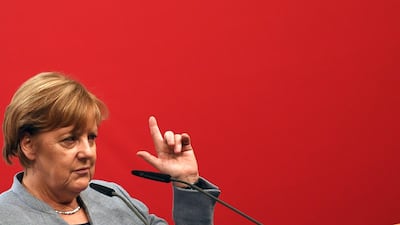Like sunlight, the cleansing effect of global growth is sustaining the fortunes of political leaders who have struggled to win elections in recent months.
As new governments emerge, the brightening spots obscure the underlying turbulence that is bound to return.
In The Hague, a coalition government was formed last week after a leisurely 208-day interlude after the general election. Crisis, what crisis? Meet the new guy, same as the old guy. Mark Rutte, a pleasant liberal, was handed the seals of office for the third time.
Mr Rutte has been helped by the economic winds. The Netherlands economy has just pushed past three per cent growth for the first time in a decade.
The hot-button issue of migration has been dealt with through a pact to take welfare from refugees. Geert Wilders, the far-right Islamophobe, has been strangely accepting of his party's exclusion from office despite taking second place at the polls.
As with the Dutch, the Germans are still dealing with the fallout from an election that saw voters rush to the extremes.
_______________
More from Opinion
In Syria, Assad might be winning the war, but he is far from winning the peace
Why Donald Trump is prepared to ditch the Iran nuclear deal
With China rising and America looking inwards, what is Europe's grand vision?
_______________
Three weeks after the result that humbled Angela Merkel, there is not much to say. It is possible and probable there will be a new government by the turn of the year. Equally the devil is in the details and Mrs Merkel could be still in limbo until early 2018.
At the heart of Europe, Henry Kissinger's provocation "who do I phone" remains the key and unanswered test.
Raring to go on the sidelines is the French president Emmanuel Macron, who is still the dominant force in French politics.
His honeymoon after beating the far-right in May and leading his new party to a parliamentary majority in June has a wasting shelf life Within Europe his agenda has gone nowhere. Like a hotrod in the desert, he is designing pretty circles in the sand but making up no ground for all his noise.
Even without the British decision to leave and the Catalan secession crisis, the EU faces big make-or-break decisions. The slow but sure political talks are no harbinger of success.
Two big pan-European decisions could determine the credibility of the block. Restricting the rights of non-nationals, particularly from eastern Europe, to move west is Mr Macron's best chance of keeping the far right permanently in the shadows. Brexit proved that a naive acceptance of continent-wide labour movement is a hiding to disaster. Populist eastern European politicians are cunningly stoking a counter-reaction designed to forced another wave of exits in a decade or so.
The second big decision is a banking union across the EU. In particular a guarantee of customer bank deposits from Malta to Finland. It is looking like a great undeliverable of upcoming negotiations.
Lurking virtually unspoken behind Europe’s endless cycle of summits is the dawning reality that the project stands or falls on German domination.
Enlargement of the western European club of 12 states to 28 mainly entailed a spread across the regions most bound in to the broad sweep of Germanic history. At root this is why the British had to bolt.
Berlin under the still hand of a dominant but ageing leader is resistant. As Mrs Merkel prepared for coalition talks, a document emerged last week in Berlin from the country’s foreign policy establishment entitled “In spite of it all, America”.
_______________
Read more from Damien McElroy
Europe receives a wake-up call in the battle to counter extremism
America is a troubled place, a country struggling to find the right direction
A new factor has emerged in the ISIL battle: Iran
_______________
Don’t be tempted to think that this should really have been named ‘In spite of Trump, America”. It was a historic call for a standstill against Germany’s untrammeled leadership of the European block.
Berlin was warned to stick with the trans-Atlantic priorities. Divergence into trade wars and migration was depicted as a path to instability. Siren calls to abandon a strategic freeze on ties with Russia was a frightening prospect for the experts.
A Germany that orchestrated European politics would indeed marshal its allies along the lines set out so clearly in the paper. The prosperous states of the eurozone, like France and the Netherlands, are increasing satellites of the German economy. Another band, notably ltaly, is dependent on the ultimate bailout power of the German exchequer. Others like Spain now need Germany's centrifugal force just to maintain their own cohesion.
Angela Merkel has surpassed Mr Rutte to land a fourth term in office. In doing so, she and he are past masters of the art of centrist triangulation that dominated Western politics after the Cold War. The space that was their playground has steadily shrunk. Europe has fractured once and will in all likelihood do so again.
The revival of Europe is not as it seems and the worry is the project remains a bubble. It is strong and whole as long as the sheen holds. It is also fragile and liable to pop.


